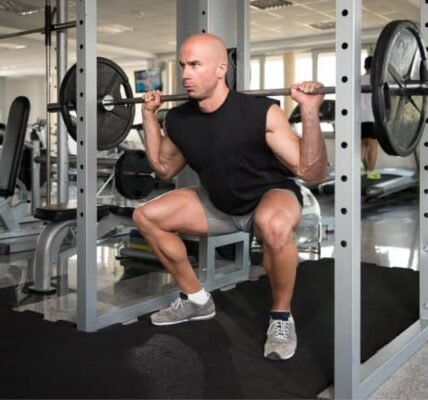
The dumbbell shoulder press is a staple exercise for building shoulder strength, enhancing upper body stability, and developing well-rounded deltoids. It’s a versatile exercise that can be performed at the gym or at home with minimal equipment, making it ideal for beginners and seasoned athletes alike. In this comprehensive guide, we’ll break down everything you need to know about the dumbbell shoulder press, from technique to variations and tips for optimizing your results.
What is the Dumbbell Shoulder Press?
The dumbbell shoulder press is an overhead pressing exercise that targets the deltoid muscles of the shoulders. It also engages the triceps, upper chest, and stabilizer muscles in the core and upper back, making it a compound movement that helps improve overall upper body strength.
Muscles Worked
The dumbbell shoulder press mainly targets the following muscles:
- Deltoids (Shoulders): The three heads of the deltoid muscles (anterior, lateral, and posterior) are the primary focus of the exercise.
- Triceps: These muscles assist in extending the arms during the pressing motion.
- Upper Chest (Clavicular portion of the pectoralis major): Engaged to stabilize the weight during the press.
- Trapezius and Rotator Cuff Muscles: These muscles support shoulder movement and stability.
Benefits of the Dumbbell Shoulder Press
The dumbbell shoulder press offers numerous benefits that go beyond just building muscle. Here’s why you should include this exercise in your shoulder routine:
- Shoulder Development: It is one of the most effective exercises for developing size, strength, and endurance in the deltoids.
- Improved Stability: The use of dumbbells forces each side of the body to work independently, enhancing shoulder joint stability.
- Versatility: Dumbbells allow for a greater range of motion and can be adjusted to suit individual body mechanics, making the exercise adaptable to different fitness levels.
- Core Engagement: Pressing weight overhead activates the core muscles to maintain balance and posture during the movement.
How to Perform the Dumbbell Shoulder Press
Performing the dumbbell shoulder press correctly is crucial for maximizing results and avoiding injury. Here is a step-by-step guide to ensure proper form.
Step-by-Step Instructions
- Setup:
- Sit on a bench with back support or stand with your feet shoulder-width apart.
- Hold a dumbbell in each hand at shoulder height, with your palms facing forward. Your elbows should be bent and aligned slightly in front of your body to maintain shoulder integrity.
- The Press:
- Engage your core by tightening your abs and glutes to stabilize your body.
- Press the dumbbells overhead by extending your arms until they are fully straight but without locking your elbows. Ensure that your palms are facing forward throughout the movement.
- Lowering the Weights:
- Slowly lower the dumbbells back to the starting position at shoulder height. Control the descent to maximize muscle engagement and prevent shoulder strain.
- Ensure that your elbows do not drop below shoulder level to keep tension on the deltoid muscles.
- Breathing:
- Exhale as you press the dumbbells overhead.
- Inhale as you lower the weights back to the starting position.
Common Mistakes to Avoid
To get the most out of your dumbbell shoulder press, be mindful of these common mistakes:
- Flaring the Elbows: Keeping your elbows too far out to the side can strain the shoulder joints. Keep them slightly in front of your body during the movement.
- Using Momentum: Avoid swinging your body to press the weights up. This reduces the effectiveness of the exercise and increases the risk of injury. Instead, engage your core to press the weights in a controlled manner.
- Overarching the Back: If your lower back is arching excessively, it could be a sign that the weights are too heavy or that your core isn’t properly engaged. Maintain a neutral spine throughout the exercise.
Dumbbell Shoulder Press Variations
While the traditional dumbbell shoulder press is highly effective, there are several variations you can try to keep your workouts fresh, target different muscles, and challenge your body in new ways.
1. Seated Dumbbell Shoulder Press
This variation involves sitting on a bench with back support, which helps to reduce the involvement of other muscles and isolate the shoulders more effectively.
- Benefits: Offers more stability and allows you to focus on lifting heavier weights, as the backrest provides support.
2. Standing Dumbbell Shoulder Press
Performing the shoulder press while standing engages your core and lower body to stabilize the weight, making it a great option for improving overall functional strength.
3. Arnold Press
Named after Arnold Schwarzenegger, this variation involves rotating your wrists as you press the dumbbells overhead, which targets the front delts more than a standard shoulder press.
- How to Perform:
- Start with the dumbbells in front of your shoulders, with palms facing your body.
- As you press the dumbbells overhead, rotate your wrists so that your palms face forward at the top of the movement.
- Rotate your wrists back to the starting position as you lower the weights.
- Benefits: Engages all three heads of the deltoid and increases shoulder mobility.
4. Neutral Grip Dumbbell Shoulder Press
In this variation, your palms face each other instead of forward, which can reduce stress on the shoulder joints and increase triceps activation.
- Benefits: Ideal for those with shoulder mobility issues, as it places less strain on the rotator cuff.
5. Single-Arm Dumbbell Shoulder Press
Pressing one dumbbell at a time forces your core to work harder to stabilize your body, enhancing balance and unilateral strength.
- How to Perform:
- Perform the shoulder press with one arm while the other rests at your side or holds a weight for balance.
- Benefits: Corrects strength imbalances between arms and engages stabilizing muscles.
6. Half-Kneeling Dumbbell Shoulder Press
This variation is performed in a half-kneeling position, with one knee on the ground and the opposite foot planted in front. It helps to activate the glutes and core while reducing strain on the lower back.
- Benefits: Improves posture, balance, and coordination while still focusing on shoulder strength.
Tips for Maximizing Your Dumbbell Shoulder Press Results
The dumbbell shoulder press is an excellent exercise, but incorporating a few strategies can make it even more effective.
1. Focus on Progressive Overload
To build stronger shoulders, you need to gradually increase the load you’re lifting. This can be done by adding more weight, increasing the number of sets or reps, or reducing rest time between sets. Progressive overload is key to muscle growth.
2. Warm Up Properly
Warming up before any shoulder workout is essential for preventing injury and optimizing performance. Start with light dynamic stretches and mobility exercises like arm circles or band pull-aparts to get your shoulders ready for the workload.
3. Don’t Forget the Lower Body
Even though the shoulder press focuses on the upper body, your lower body plays a critical role, especially in standing variations. Engage your glutes and legs to provide a strong base for the press.
4. Use Proper Weight
Select a weight that allows you to complete the desired number of repetitions with good form. Lifting too heavy can lead to poor technique and increase the risk of injury. It’s better to lift lighter with perfect form than heavier with compromised technique.
5. Incorporate Rest Days
Shoulder muscles are smaller and tend to fatigue faster, so rest is crucial for recovery and growth. Incorporate at least one or two rest days between shoulder workouts to give your muscles time to repair and strengthen.
How to Incorporate Dumbbell Shoulder Press into Your Workout Routine
The dumbbell shoulder press can be used in various ways depending on your fitness goals. Here are some ideas on how to incorporate it into your routine:
Strength-Focused Routine
For those looking to build raw strength, aim for lower reps with heavier weights. You might include the dumbbell shoulder press as part of a strength-training program alongside other compound lifts like bench presses and squats.
- Sets/Reps: 4 sets of 4-6 reps
- Rest: 2-3 minutes between sets
Hypertrophy (Muscle Growth) Routine
For muscle growth, the focus should be on moderate weight with higher reps. Combine the dumbbell shoulder press with isolation exercises like lateral raises to fully target the deltoids.
- Sets/Reps: 3-4 sets of 8-12 reps
- Rest: 60-90 seconds between sets
Endurance Routine
If you’re looking to build endurance, aim for lighter weights and higher reps, keeping the pace brisk but controlled.
- Sets/Reps: 3 sets of 12-15 reps
- Rest: 30-60 seconds between sets
Full-Body Routine
You can incorporate the dumbbell shoulder press into a full-body workout by pairing it with lower body and core exercises.
Example full-body workout:
- Dumbbell shoulder press – 3 sets of 8-10 reps
- Squats – 3 sets of 10-12 reps
- Planks – 3 sets of 30 seconds
The dumbbell shoulder press is an essential exercise for anyone looking to build strong, well-rounded shoulders. By mastering the correct form, incorporating variations, and following a strategic workout plan, you can maximize the benefits of this versatile exercise. Whether you’re aiming for strength, muscle growth, or endurance, the dumbbell shoulder press deserves a spot in your workout routine.




